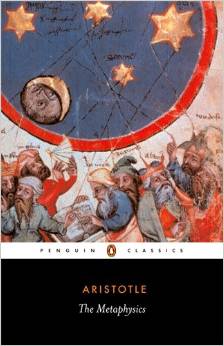the words "metaphysics" and "metaphysical" derived from Greek words μετά (half, "over", "above"or "after") and φυσικά (Physika, "physical"). I prefer this definition, because thinking that it gives the right  meaning and is closer to issues that I would like being treated in these pages. The definition adequacy of metaphysics as "science of the world beyond nature" in my opinion is out of doubt, because 'physis' in greek means 'visible objects'. Metaphysical philosophy is then at branch of philosophy that studies the fundamental questions about the existence of things that you think are existing, but cannot be seen.
Some critics of the Latin civilization say that's an error of the European scholastic philosophy. Those opinions are based about the publisher of Aristotle works, Andronicus of Rhodes, who's thought to have placed on the shelf the books on Metaphysics after another work, 'Physics', and therefore has called them μετα τα φυσικα βιβλία (ta meta ta Physika biblia ) or "books coming after physical books.".
Metaphysics is the most famous Aristotle's work. It consists of notes that Aristotleprepared for his classes within the Peripato. Aristotle poses fundamental problems about being and why of becoming by searching for the first causes and principles of it. The translation, which is faifthul to greek texts,
offers a modern terminology and a clearly articulated scanning of the various paragraphs, thanks to the newness of the dedications. The notes to text are short and simple, and clarify the more difficult steps. Precious is the final apparatus: there are collected in summary the content of each book and chapter of Metaphysics. The volume is also enhanced by a bibliographical appendix. This is a literally precious book.
meaning and is closer to issues that I would like being treated in these pages. The definition adequacy of metaphysics as "science of the world beyond nature" in my opinion is out of doubt, because 'physis' in greek means 'visible objects'. Metaphysical philosophy is then at branch of philosophy that studies the fundamental questions about the existence of things that you think are existing, but cannot be seen.
Some critics of the Latin civilization say that's an error of the European scholastic philosophy. Those opinions are based about the publisher of Aristotle works, Andronicus of Rhodes, who's thought to have placed on the shelf the books on Metaphysics after another work, 'Physics', and therefore has called them μετα τα φυσικα βιβλία (ta meta ta Physika biblia ) or "books coming after physical books.".
Metaphysics is the most famous Aristotle's work. It consists of notes that Aristotleprepared for his classes within the Peripato. Aristotle poses fundamental problems about being and why of becoming by searching for the first causes and principles of it. The translation, which is faifthul to greek texts,
offers a modern terminology and a clearly articulated scanning of the various paragraphs, thanks to the newness of the dedications. The notes to text are short and simple, and clarify the more difficult steps. Precious is the final apparatus: there are collected in summary the content of each book and chapter of Metaphysics. The volume is also enhanced by a bibliographical appendix. This is a literally precious book.